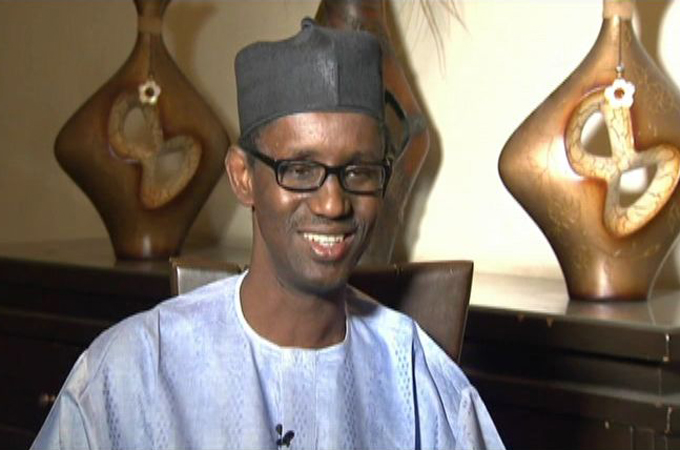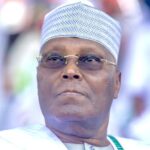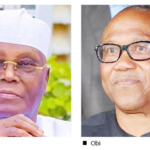Last weekend, the reigning stars of Nigeria’s elite had a brief rendezvous at the residence of Malam Nuhu Ribadu. It was the strangest gathering of politicians I had ever witnessed firsthand, and my friends and I couldn’t resist hushed commentaries on the sights of the ironies staring us in the face. The occasion was the wedding Fatiha of his only daughter, Fatima, and Atiku Abubakar’s son, Aliyu.
This was the second time the pioneer EFCC Chairman had hosted such a cast of political characters this year. In January, his first two sons got married and their wedding Fatiha sessions, which held in Fufore, Adamawa state, and in Abuja were attended by Vice President Yemi Osinbajo, former Vice President Atiku Abubakar, Aliko Dangote, Femi Otedola, the late Abba Kyari, and Governors Atiku Bagudu (Kebbi), Abdulrahman Abdulrazaq (Kwara), Kayode Fayemi (Ekiti), Abubakar Sani Bello (Niger) and Aminu Masari (Katsina). Others in attendance were former Governors of Ogun (Ibikunle Amosun), Bauchi (Mohammed Abubakar), Sokoto (Aliyu Wamakko), Zamfara (Mahmud Shinkafi), and Adamawa (Mohammed Jibrilla). This was a gathering of a very particular set of people.
The recent wedding was, also, stimulating poetry and a party of contrasts. A pastiche of Nigerian politics. It amplified what we had always known, that the political elites are a close-knit group of familiars despite their declared differences and feuds. While their followers were rioting on social media and severing ties or perhaps even murdering one another offline, PDP’s Atiku Abubakar and APC’s Bola Tinubu, who are potential candidates of their parties in 2023, were found under the same room, seated side by side and catching up on usual times. Kwankwaso and his erstwhile ruthless deputy he underestimated, Ganduje, were also there. Their Sokoto state counterparts, former Governor Wamakko and Governor Aminu Tambuwal shared the space alongside former Governors Danjuma Goje and Dankwambo and Governor Inuwa Yahaya of Gombe state whose hostility is well-established.
Under the same roof, Adamawa politics presented its own tension with the presence of former Governors Murtala Nyako and Bala Ngilari and their political archrival, current Governor Ahmadu Fintiri. In the same crowd was also Governor Nasir el-Rufai going from person to person to exchange pleasantries with opponents the media had portrayed as his irreconcilable foes. Southwest politics also manifested in the tension between Tinubu and Governor Fayemi. It’s a crowd that one wouldn’t have believed if told without proof.
Both weddings were opportunities to reflect and review our perceptions of political elites. In demonstrating partisan allegiances, supporters of these politicians have created hostile camps and destroyed friendships built over several years. Even though some of these politicians appeared antagonistic towards their opponents, they still manage to find common ground, and are bound by interests that override any sense of animosity or vitriol. They also always find a meeting point through such neutral occasions as a wedding to laugh off their so-called “feuds”, perhaps agreeing, in retrospect, that they might have taken things too far.
What binds, say, Ganduje to Kwankwaso and vice versa—and what binds Tinubu and Atiku—is stronger than whatever bonds they share with their supporters. The nation’s political actors are bound in such a way that their religious, ethnic, regional and, especially, political affiliations, which their supporters tend to cite when pledging their allegiances, are overlooked in pursuits of class solidarity. They are like children of the same mother; no matter how messy their fight, there is always a middle-ground. In their case, the desperation to remain at the top of the food chain.
When our friend Abubakar Idris, the government critic popularly known as Dadiyata on Twitter, was abducted in Kaduna last year, the reactions from certain partisan camps were frightening. Dadiyata was a fierce Kwankwasiyya ideologue and critic of both Governors Ganduje and El-Rufai. The former he antagonised because of his allegiance to Kwankwaso, and the latter either for affiliation to different political parties or personal choices. It’s still unclear who seized him that fateful night over 400 days ago, and the sustained advocacies for answers have revealed the best and the worst of rivalries among the political rank-and-file. One partisan even gloated that his principal, of whom Dadiyata was a critic, had better use of his time than bother about the whereabouts of a “nonentity.”
Ribadu’s residence would’ve probably been the perfect rehab for the political foot-soldiers desperate to prove allegiances to their principals. Even Ribadu’s life as the hunter who’s preserved his friendships with politicians to whom he was once the major source of misery, is a life lesson. He’s the last of the politicians one would typically imagine as host to such diverse groups. Since joining partisan politics in 2011, he has gone on to run for President and Governor—and that’s that. He had not held any active public role since leaving office. His cross-partisan networks are a legacy of his sterling public service record, and he has managed his relationships well despite his past in what is the most unpopular job there is.
The diversity of the gathering at his children’s weddings was also a tribute to his relationship with both sides of the political divides. He has registered membership at both the APC and briefly with the PDP, cementing further that bipartisan line. And whichever direction the 2023 presidential election swings, it’s safe to assume that the next President or Vice President of Nigeria were probably seated among us for the wedding Fatiha.
Tinubu and Atiku are the most politically intimidating, experienced and influential in the APC and the PDP, respectively, and also capable of financing their elections independently. Kwankwaso, of course, commands more grassroots following than the two in the North and stands a chance of emerging as a presidential candidate in the PDP, and vice-presidential candidate in the APC—if he defects, and survives the backlash of those who’ve laboured for the ruling party. But for PDP Governors, Tambuwal has been a longtime favourite for President but such may not be the case if zoning politics takes the front seat on the road to 2023.
Additionally, if the Northwest’s politics of demographic size isn’t a variable in the choice of a northern running mate to a southern presidential candidate, Senator Kashim Shettima, who’s also a guest, would be a brilliant choice, and, aside from being a credible figure in the media and various intellectual circles as a result of his stewardship as immediate past Governor of Borno state, he has no glaring baggage to stall any ticket. Some circles have also been promoting a Fayemi – El-Rufai ticket, and it’s left for the ruling party to decide their next heirs.
So, whichever political party one identifies with, it’s impossible to forecast Nigeria’s next President and Vice President without acknowledging Ribadu‘s guests. The joke, unfortunately, is on their gullible supporters who have severed ties with friends and even murdered opponents to appease a political god who routinely parties with the god of the opponent eliminated in a fit of partisan rage.

 Join Daily Trust WhatsApp Community For Quick Access To News and Happenings Around You.
Join Daily Trust WhatsApp Community For Quick Access To News and Happenings Around You.

